| |
|
|
| |
|
|
| |
 |
|
| |
|
|
| |
|
|
| |
|
|
| |
|
|
| |
 |
|
| |
|
|
| |
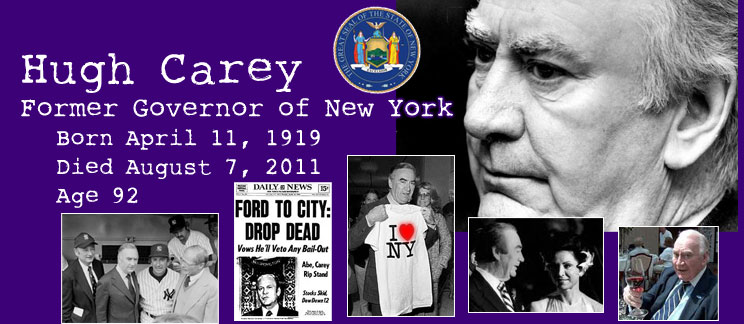 |
|
| |
|
|
| |
Hugh Carey was the 51st governor of New York, and many feel he had the hardest job of all the governors that had been before. He helped rescue New York from Nelson Rockefeller and the brink of financial collapse in the 1970s, the direst emergency a governor had faced since the Depression. Here's what might have made it more difficult for him: He ran for governor as a recently widowed congressman, after having seen his wife die slowly of cancer. He had seven school-age children still at home. He had previously dropped out of the race for mayor when two teenage sons — he had 14 children — were killed in a car accident. (Along with a teenage girl, so I suspect there is more to this story than meets the eye.) While still governor, he remarried an exotic woman named Evangeline Gouletas who said she had been married twice before and that her first husband had died, but it turned out that there were three former husbands, all still alive. In any event, Carey started dyeing his hair.
There's lots more here, and I deliver the juicier stuff rather than the fiscal stuff, because it's incredible that I lived through all this and read the paper fairly regularly and had no idea about most of it. How these guys were protected from the human interest tale-spinners. It was truly a different world. On the other hand, perhaps that's what helped him be a successful public servant: not having too much known by the public.
Hugh Carey was 90-something years old. Erik and Exuma get the duet, which nets them 5 points. Two for the hit, 3 for the partnership.
— Amelia
|
|
| |
|
|
| |
 |
|
| |
|
|
| |
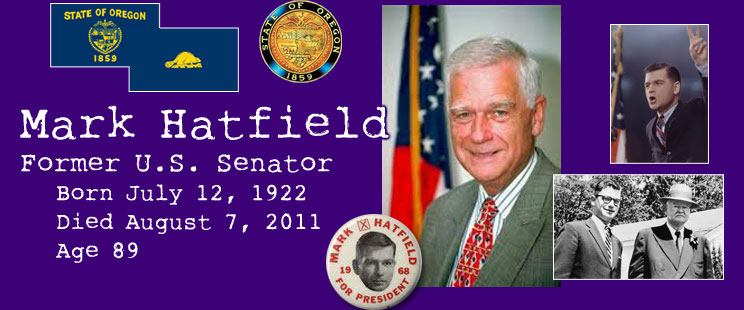 |
|
| |
|
|
| |
Mark Hatfield was a Republican senator back in the day.
He brought his state, Oregon, billions of dollars for things like scientific research, higher education, transportation infrastructure. He thought a light rail system was the answer to a lot of problems.
He opposed the war in Vietnam. He opposed Reagan's defense buildup. He redirected the money meant for the Pentagon to social safety-net programs. He voted against the Persian Gulf War. He opposed Clinton's Bosnian war, too.
Hatfield, the Republican.
He knew how to build alliances, listen, and show respect when opinions differed. He was apparently quite kind.
He campaigned to prohibit the sale of arms to undemocratic countries that do not respect human rights. He helped pass a ban on underground nuclear tests.
He said, "We infect the rest of the world with our lust for weapons."
Hatfield, the Republican.
Who never voted for a military authorization bill.
Who voted against a balanced budget amendment because he thought it would starve social programs of federal money.
Who passed civil rights laws in Oregon a decade before the federal government got around to it.
Hatfield, the Republican.
He had his problems, he had his detractors, he was often very alone in the Republican party. He was not, however, a cookie-cutter ideologue, and his political integrity was a fact of Senate life. Of everyone's life.
Hatfield, the Republican, died last month at 89. Gerard Tierney and Morris the Cat get the hit and 8 points. 5 and 3 for the duet.
Visko Hatfield sat down with his father a few months ago as his health grew more fragile, he said. At the time, Visko asked what he could do for him.
"You need to save a life," said his father, who lived a life of public service.
"Whose life should I save?" Visko asked.
Hatfield's answer: "The first one you can."
— Amelia
|
|
| |
|
|
| |
 |
|
| |
|
|
| |
|
|
| |
|
|
| |
Was it Hugh Massingberd at an obituary writers' conference who gave us the code words in obituaries? A powerful negotiator was a bully, for example. Convivial is code for lush. Gave colorful accounts of exploits: Liar.
How absolutely lovely that a secret agent/resistance leader/saboteur should have code words in her obituaries.
Okay, she was convivial. Having your very own bar stool at the Stafford Hotel from which you deliver your colorful accounts over decades may be a clue. But despite all the code words, it would appear that the exploits of Nancy Wake were absolutely true. Incredible. But true.
She joined the Special Operations Executive or the SOE, which was recruiting French-speaking women to serve as couriers. The Gestapo called her "The White Mouse" because she was elusive. In April of '44, she was dropped into the Auvergne region with the leader of the Freelance resistance circuit. Stuck in a tree, a Frenchman said that he hoped all trees could bear such beautiful fruit. Don't give me that French shit, was her reply. I hope it was in French.
After helping to organize and arm the locals, she was soon fighting the Germans alongside them, and drinking them under the table when day was done. She killed people without much fuss, including a French woman spy, and she reported that it didn't put her off her breakfast.
She once walked 100 miles and biked another to re-establish contact with London. She once took command of a section whose leader had been killed, and directed the covering fire while the group withdrew. Once the liberation of France had occurred, she was awarded every medal in the book from England, France and America.
She had a good war. She never really adjusted to peace. Desk jobs were out. She ran for office unsuccessfully in Australia, where she was from. She married an RAF bomber who, shockingly, liked a drink.
In 2004, she was finally made a Companion of the Order of Australia. She lived in the Star and Garter home for ex-servicemen and women in Richmond, Surrey. "When I die," she once said, "I want my ashes scattered over the hills where I fought alongside all those men."
For Nancy Wake, Buford gets 7 points. Two for her age and 5 for the solo. He's brilliant, which is code for something.
— Amelia
|
|
| |
|
|
| |
 |
|
| |
|
|
| |
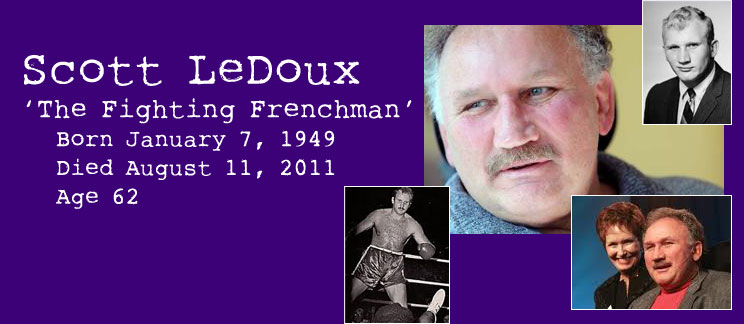 |
|
| |
|
|
| |
Scott LeDoux, the Fighting Frenchman, a contender for the heavyweight title in the mid-1970s and early '80s, and who played football in college, died of Lou Gehrig's disease, which is altogether the wrong disease for him. So it goes.
He was known for his left hook and his temper. LeDoux had 33 wins, 22 of them knockouts. He fought champions and champions-to-be. He fought Leon Spinks to a draw two fights before Spinks beat Ali for the title. His championship fight with Larry Holmes was stopped when LeDoux took a vision-damaging blow to the eye. He begged for the fight to go on. What's an eye, he said, when you've given your heart. Which is not exactly quotable, but there it is in the New York Times.
He is, perhaps, most famous for the bout with Johnny Boudreaux in 1977. He was so angry because he thought the fight was rigged (uh, duh) that he knocked off Howard Cosell's toupee.
Good thing for Marv Albert he never played basketball.
Powerful hit for Allen Kirshner, EdV and Scott Tierney, who each get 12 points, because The Fighting Frenchman must have taken one too many blows to the head and was only 62. 11 for age, one for trio.
— Amelia
|
|
| |
|
|
| |
 |
|
| |
|
|
| |
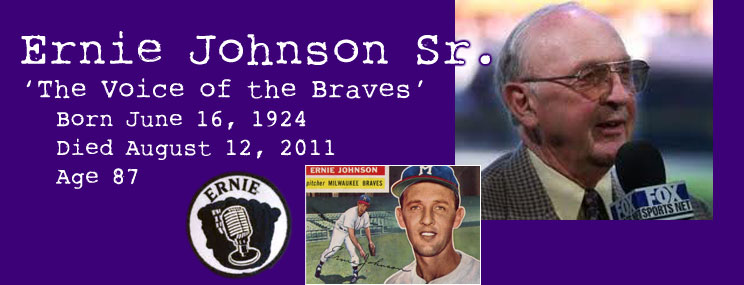 |
|
| |
|
|
| |
This absolutely lovely tribute was written by Tim J, whose hit this was. He gets a well-deserved 10 points. I'd give him more if I could.
* * *
If you grew up as a baseball fan in the Southeast in the 1970s, you knew Ernie Johnson. You may not have known his face, but his voice was as familiar as any other you had heard. I cannot recount the number of nights I sat in a 1968 Volkswagen beetle listening to Ernie broadcast Atlanta Braves games on our local AM radio station. To me, he will always be the Voice of the Braves.
Ernest Thorwald "Ernie" Johnson was born on June 16, 1924 in Brattleboro, Vermont. Johnson dedicated six decades of his life to the game of baseball, as both a player and announcer. He was signed as a free agent pitcher by the Boston Braves prior to the 1942 season. He began his professional baseball career with Hartford, a Braves farm club. But, like so many players of his era, Johnson took time off from the game to serve in World War II, serving three years in the U.S. Marine Corps, eventually seeing action in the invasion of Okinawa. Some of his war memorabilia are on display in the Braves Museum at Turner Field, and the Marine Corps flag flies atop the flagpole in his front yard. Upon his return from the war, Johnson worked his way through the minor leagues, eventually making his first major league appearance against the Philadelphia Phillies on April 28, 1950. His first win came two months later against the New York Giants on June 30, 1950. In 1957, he had a stellar 1.29 ERA during the Braves' World Series win against the New York Yankees. But his stats are the least of his story.
His calm but enthusiastic voice and vast knowledge of the game gained him his first broadcasting job as the host of a baseball show called "Play Ball!" on a local Milwaukee television station. From there, he was hired as the color commentator for Braves radio broadcasts in 1962.
When the Braves decided to move from Milwaukee to Atlanta for the 1966 season, Johnson, along with his wife Lois and their three children, moved to Atlanta a year ahead. Johnson traveled the Southeast setting up what would become known as the Braves Radio Network. Johnson would personally drive from station to station to convince station managers to carry the Braves games. After the Braves' move to Atlanta, Ernie took over play-by-play duties. His success was followed a few years later when Ted Turner launched his WTBS Superstation in 1973, making the Braves "America's Team" and by extension, Johnson the "Voice of the Braves." He was there for many of the team's highlights, including Dale Murphy's consecutive MVP seasons in 1982 and 1983, Phil Niekro's no-hitter, and Hank Aaron's 715th home run on April 8, 1974. I did not get to hear Ernie's broadcast of Aaron's record-breaking home run, but only because I had the great fortune to be at the game that night. My commemorative certificate, autographed by Aaron, still hangs on my wall to this day, along with my ticket stub.
When Johnson retired from his full-time announcing duties in 1989, the Atlanta Braves were a perennial last-place team. They frequently drew fewer than 7,000 fans per game. But on Saturday, September 2, 1989, a day proclaimed by the City of Atlanta as Ernie Johnson Appreciation Day, the Braves fans came together to say good-bye to Ernie. On that night 42,020 fans showed up, the highest-attended game of the season. He meant that much to the Braves and their fans. When asked about the size of the crowd, Johnson selflessly remarked, "I hear they're showing fireworks."
In a 27-minute ceremony, Johnson was presented with such gifts as a recliner by catcher Bruce Benedict and outfielder Dale Murphy; the lifetime use of a condominium in West Palm Beach during the Braves' spring training, a Mercury Sable; and a satellite dish and 46-inch television presented by his broadcast partners for the previous 14 years, Skip Caray and Pete Van Wieren. After the ceremony, Johnson received a two-minute standing ovation from the fans. After the game, Johnson was taken up to the broadcasting booth, which had been named in his honor. A fishing net used by Johnson to snare foul balls into the booth still stood in the corner.
Ernie was still announcing part-time in 1991 during the Braves' "worst to first" season, and continued his part-time duties up until 1999. Johnson was named Georgia's Sports Broadcaster of the Year in 1977, 1983 and 1986, and was elected to the Braves' Hall of Fame on August 24, 2001. His son, Ernie Johnson Jr., followed in his father's footsteps as an announcer for Braves broadcasts.
On behalf of Braves fans everywhere, I'd like to express my appreciation for Ernie's enthusiasm for the game. It never would have been the same without you, Ernie. I hope your name will soon adorn the hallowed halls of Cooperstown. You deserve it.
— Tim J
|
|
| |
|
|
| |
 |
|
| |
|
|
| |
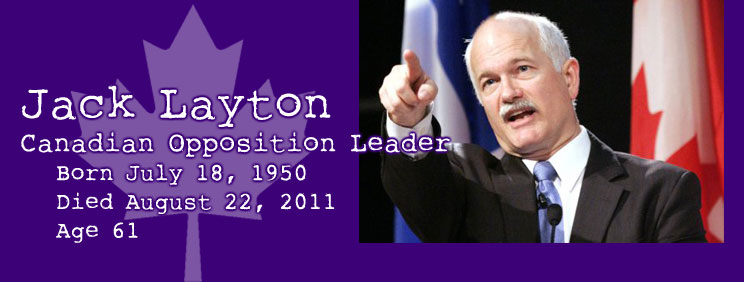 |
|
| |
|
|
| |
I knew Charlene was the very person to write this. Don't you agree? Thank you, Charlene.
* * *
What's wrong with Jack Layton? I'll tell you what's wrong with Jack Layton. He's dead, and I don't want Jack Layton to be dead. I've been putting off writing this for a month because somewhere in my bear-of-very-little-brain mind I don't want to believe that Jack Layton is dead. I don't know if anyone in the country really wants to believe it. They're calling him "Canada's Diana" on the radio these days and for a very good reason: Like Diana dying in a car crash just as her life was starting again, Jack's death just as he became Leader of the Opposition and began to fulfill his promise was just so fucking unfair.
Jack had both charisma and common human decency, which isn't something you usually see in politics. This was a guy who almost single-handedly turned an also-ran socialist party into the Official Opposition and (in the infuriatingly short time he had) proved to be an effective and valuable Leader of the Opposition. This was a guy who at his wedding to Olivia Chow in 1988 took a moment to speak out in favour of same-sex marriage. This was a guy who loved his mother-in-law to the point that he learned Cantonese for her. And did you know that he was such an ardent Trekkie that he owned his own custom-made Starfleet uniform? (PS: Louis' worst nightmare or what?) Unlike most politicians I've met, he wasn't afraid to stand up for what he thought was right even if nobody agreed with him; heck, I think he liked it when nobody agreed with him, because it gave him a chance to convince someone. But it was his personal popularity, not his eloquence or history or even his party platform, that gave Le Bon Jack and the NDP 103 seats in the 41st Parliament, including a near-sweep of Quebec.
Two short months after he was sworn in as Leader of the Opposition, Jack Layton was diagnosed with a new form of aggressive cancer. He looked drawn and aged at his press conference; I saw it on TV in a department store and the people around me gasped when he reached the podium. Four weeks later he was dead. And two days before he died, two days before he left his wife, his son, and his daughter forever, he somehow had the poise and presence of mind to write a letter to the Canadian public that contained this:
My friends, love is better than anger. Hope is better than fear. Optimism is better than despair. So let us be loving, hopeful and optimistic. And we'll change the world.
Goddammit.
While the rest of us here in Canada were watching Jack's state funeral, DGH (not Canadian) was apparently out singing "Solidarity Forever" with the Grim Reaper because he chose Jack in this year's AO deadpool. He gets 11 points plus 5 for the solo. Total: 16.
— Charlene
|
|
| |
|
|
| |
 |
|
| |
|
|
| |
 |
|
| |
|
|
| |
JD reported this late, and he knows the rules. Report it late, write it. As usual for JD, it's wonderful.
* * *
Jack Warner wanted his own Shirley Temple, and he had an army of scouts seeking one. They found her on the London stage (well, actually they found her in a British movie, but she was mainly a stage performer) and figured (probably rightly) that the seven-year-old Sybil Jacobson was their best shot. They brought her to America, they coached her, they changed her name, they put her in her own star vehicle with some of their most promising filmmakers, including the legendary Michael Curtiz. It sucked. (I've only seen about a third of it on TCM, but that third sucks enough for a whole picture.)
They gave her a few more tries, teaming her up with the likes of Al Jolson and Seabiscuit. (Seriously.) While Sybil Jacobson certainly had her admirers, particularly among the Temple-fatigued, she was too obviously a foreign knock-off. She was no more of a threat to Shirley Temple's box-office dominance than Don Cheadle is to Will Smith's. She was hardly unsuccessful, her pictures were moderately popular and made good money, but she wasn't headed for the Shirley Temple level by any stretch.
After an uncharacteristically long period of tolerating the underperforming star, Warner shrugged the whole enterprise off and "loaned" her out to Fox, where she made a couple of minor classics with — yep, Shirley Temple. In one of them, the story goes, Temple's harpy-bitch-queen mother Gertrude demanded that Jason's best scenes be cut, lest they detract any attention from Little Miss Superstar. Amusingly enough, Fox had given Jason tremendous support, going so far as to hire Wendy Hiller as a dialogue coach to her when she appeared in The Little Princess, but they caved without hesitation to Gertrude Temple's wishes.
Jason's film career was over before she was a teenager. She married a writer (who, I have to note, was in the Navy at the time) at age nineteen; the marriage would last until his death in 2006. In a slightly surprising display of self-awareness from a former child star, she titled her memoir My Fifteen Minutes. Despite the crappy treatment she got, she gave no indication of any real bitterness, and considers the experience to have been "like walking into a fairytale book and becoming one of its characters." (WaPo obit's quote from her memoir.) She remained close friends with Shirley Temple for her whole life.
JD collects ten points: five each for the 83-year-old hit and the solo.
— JD
|
|
| |
|
|
| |
|
|
|

